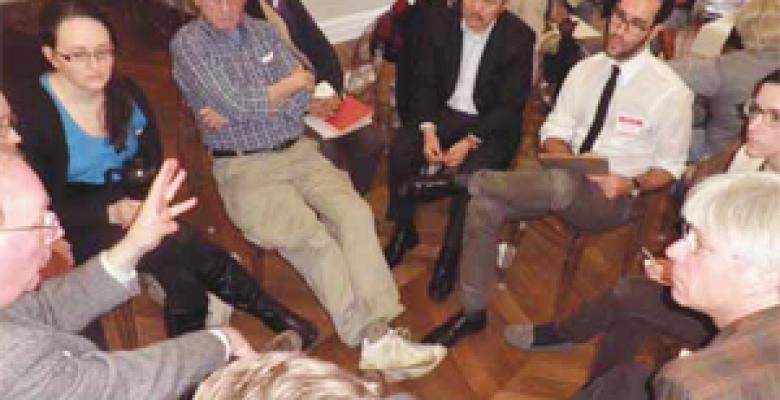Historians Seek to Widen Their Public Reach

The box office success of Steven Spielberg’s "Lincoln" presented a teachable moment for historians seeking to be heard outside the academy.
That was the message from James Grossman, executive director of the American Historical Association, at a conference last month that explored the benefits of historians engaging a wider public and contributing to life outside the university.
Grossman said the movie, which opened last fall and went on to win two Academy Awards, including best actor for Daniel Day-Lewis’s portrayal of the 16th president, should have spurred history professors in every city to pen 750-word pieces about the film for local newspapers.
The conference, “History in Action,” drew an eclectic group of historians, including some who have pursued non-academic careers or made an impact outside the academy.
“I’m fond of the term ‘extramural history,’” said graduate history student Noah Rosenblum, who helped organize the program with History Professor Pamela H. Smith.
Smith said historians need to make a stronger case for the contributions of history as a discipline, including the ability of historians to “constantly step outside of themselves” to sensitively render the lives of people in the past.
She said it was worth thinking about establishing a national historical foundation, comparable to the National Science Foundation, to highlight the powerful methodology of history and the role it plays in promoting the public good.
Other scholars noted the potential pitfalls of engaging with a broader audience.
Robert Paxton, the Mellon Professor Emeritus of Social Sciences, recalled having a French admiral call him a liar on television. His pioneering work in German archives, which brought to light that the Vichy government collaborated more willingly with the German occupation than had previously been believed, elicited strong passions. His pointed advice about venturing into the public realm: Be scrupulous about your research or it will haunt you.
John Lawrence, former chief of staff to House Minority Leader Nancy Pelosi, delivered the keynote address. He said working in a non-academic setting “by no means requires you to leave behind your love of history.”
Lawrence, who has a Ph.D. in history from Berkeley and served for many years as a House staff member, described the role he played in helping create national parks that communicate American history to visitors.
The tight market for tenure-track jobs in higher education was also discussed. History Professor Richard Bulliet recalled working for 10 weeks at CBS one summer in a program that sought out historians to work with publications, surveys and various television industry professionals.
Mark L. Phillipson, interim director of Columbia’s Graduate School of Arts and Sciences Teaching Center, said young historians need not wait to be published: They can start a blog and practice a public voice immediately.
“There is so much bad history out there,” said Eric Foner, the DeWitt Clinton Professor of History, who said that it’s important to have informed historians counter erroneous information.
William E. White of the Colonial Williamsburg Foundation, who has recorded dramatic readings and worked with re-enactors, described himself as “an unapologetic popularizer of history.”
Susan Kern, who teaches history at the College of William and Mary, offered some entertaining examples of popularized history, including a replica of the Liberty Bell as the 18th hole of a miniature golf course and a baseball printed with the Declaration of Independence.
Some historians have long crossed the porous border between the classroom and the community. Alice Kessler-Harris, the R. Gordon Hoxie Professor of American History in Honor of Dwight D. Eisenhower, noted that women’s history entered academia “on the wings of activism.”
Ansley Erickson of Teachers College spoke of getting Harlem students involved in investigating their community’s history and creating a digital archive, while J.T. Roane, a Ph.D. student in the history department at Columbia, and Huewayne Watson (GSAS’11), discussed teaching students art in urban neighborhoods in Philadelphia and Los Angeles.
There’s no telling when a historian might be in demand. That was the message from James A. Millward, a history professor at Georgetown University, who received an email from a researcher at The Daily Show with Jon Stewart when a small group of Uighurs was released from Guantanamo for resettlement in Bermuda. “You don’t brag about being on ABC or CNN,” said Millward, who has studied the ethnic Muslim minority in western China, “but the Daily Show gives you street cred.”